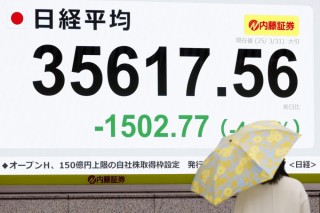Loading
Search
▼ Nikkei Stock Index Tumbles 4% On U.S. Tariff Concerns
- Category:Other
Tokyo stocks plunged on Monday, the final day of Japan's 2024 fiscal year, with the Nikkei index ending down 4 percent at a seven-month low amid selling triggered by concern over the adverse impact of U.S. tariffs on the Japanese economy.
The 225-issue Nikkei Stock Average slid 1,502.77 points, or 4.05 percent, from Friday to 35,617.56, its lowest closing since Aug. 9, and finishing down 11.8 percent from a year earlier. The broader Topix index finished 98.52 points, or 3.57 percent, lower at 2,658.73.
All sectors lost ground on the top-tier Prime Market, with decliners led by insurance, nonferrous metal, and oil and coal product issues.
The U.S. dollar briefly weakened to the upper 148 yen range in Tokyo, as the yen, seen as a safe-haven asset, was bought on fears of an economic slowdown in the United States due to President Donald Trump's trade policies, dealers said.
At 5 p.m., the dollar fetched 149.13-15 yen compared with 149.75-85 yen in New York and 150.38-40 yen in Tokyo at 5 p.m. Friday.
The euro was quoted at $1.0831-0832 and 161.53-57 yen against $1.0828-0838 and 162.18-28 yen in New York and $1.0786-0788 and 162.21-25 yen in Tokyo late Friday afternoon.
The yield on the benchmark 10-year Japanese government bond ended at a four-week low at 1.485 percent, down 0.060 percentage point from Friday's close. The debt was bought as a safe asset as the Nikkei stock index sharply dropped.
On the stock market, the Nikkei benchmark followed Wall Street's plunge late last week as fears grew over a potential economic slump accompanied by high inflation in the world's largest economy.
Heavyweight technology stocks fell sharply following declines by their U.S. counterparts, while auto shares were sold off ahead of Trump's additional 25 percent tariffs on all vehicles made outside the United States, set to take effect on Thursday.
"Concern about the Japanese economy has started to smolder, considering (the tariffs' expected) adverse impact on the auto industry, which is the country's key industry," said Kazuo Kamitani, a strategist at the Investment Content Department of Nomura Securities Co.
While optimism prevailed before Trump took office in January, as he was seen as mindful of financial markets, sentiment has since worsened as he announced a series of aggressive tariff measures despite continued stock declines, brokers said.
"The market saw that the effects of the tariffs have started to influence the real economy in the United States," dealing a blow to Japanese equities as well, said Masahiro Yamaguchi, head of investment research at SMBC Trust Bank.
"Investors have found it difficult to factor in the impact of the tariffs, as the U.S. administration is taking time to announce measures one after another, possibly leading to a risk of stocks sliding further," Yamaguchi added.
The 225-issue Nikkei Stock Average slid 1,502.77 points, or 4.05 percent, from Friday to 35,617.56, its lowest closing since Aug. 9, and finishing down 11.8 percent from a year earlier. The broader Topix index finished 98.52 points, or 3.57 percent, lower at 2,658.73.
All sectors lost ground on the top-tier Prime Market, with decliners led by insurance, nonferrous metal, and oil and coal product issues.
The U.S. dollar briefly weakened to the upper 148 yen range in Tokyo, as the yen, seen as a safe-haven asset, was bought on fears of an economic slowdown in the United States due to President Donald Trump's trade policies, dealers said.
At 5 p.m., the dollar fetched 149.13-15 yen compared with 149.75-85 yen in New York and 150.38-40 yen in Tokyo at 5 p.m. Friday.
The euro was quoted at $1.0831-0832 and 161.53-57 yen against $1.0828-0838 and 162.18-28 yen in New York and $1.0786-0788 and 162.21-25 yen in Tokyo late Friday afternoon.
The yield on the benchmark 10-year Japanese government bond ended at a four-week low at 1.485 percent, down 0.060 percentage point from Friday's close. The debt was bought as a safe asset as the Nikkei stock index sharply dropped.
On the stock market, the Nikkei benchmark followed Wall Street's plunge late last week as fears grew over a potential economic slump accompanied by high inflation in the world's largest economy.
Heavyweight technology stocks fell sharply following declines by their U.S. counterparts, while auto shares were sold off ahead of Trump's additional 25 percent tariffs on all vehicles made outside the United States, set to take effect on Thursday.
"Concern about the Japanese economy has started to smolder, considering (the tariffs' expected) adverse impact on the auto industry, which is the country's key industry," said Kazuo Kamitani, a strategist at the Investment Content Department of Nomura Securities Co.
While optimism prevailed before Trump took office in January, as he was seen as mindful of financial markets, sentiment has since worsened as he announced a series of aggressive tariff measures despite continued stock declines, brokers said.
"The market saw that the effects of the tariffs have started to influence the real economy in the United States," dealing a blow to Japanese equities as well, said Masahiro Yamaguchi, head of investment research at SMBC Trust Bank.
"Investors have found it difficult to factor in the impact of the tariffs, as the U.S. administration is taking time to announce measures one after another, possibly leading to a risk of stocks sliding further," Yamaguchi added.
- March 31, 2025
- Comment (0)
- Trackback(0)


